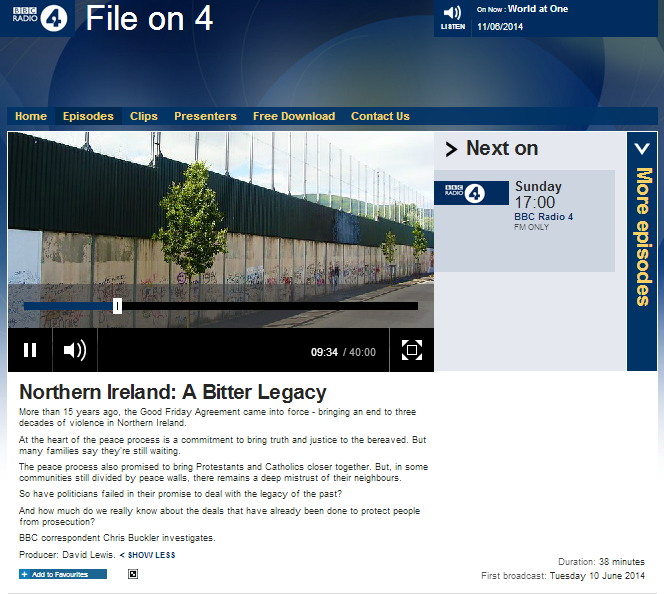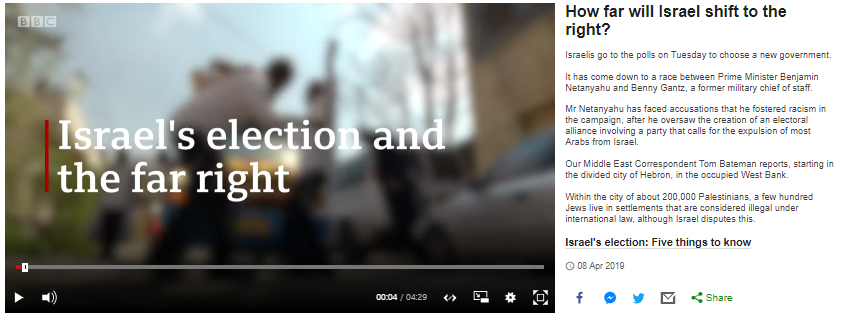h/t DL
A particularly dominant theme running through BBC coverage before and during the Pope’s recent visit to the Middle East was that of the anti-terrorist fence or, per the BBC’s “acceptable generic descriptions”, the barrier, separation barrier or West Bank barrier. We have previously addressed the BBC’s far from impartial approach to that topic on these pages, noting the following factors which form the backbone of the presentation of the issue to BBC audiences.
1) The BBC’s frequent description of the anti-terrorist fence as “controversial”.
2) The BBC’s misrepresentation of the anti-terrorist fence as a structure designed to “separate” two areas, its focus on the inconveniences caused to the Palestinian population and its failure to accurately inform audiences regarding the years of terrorism which were the background to its construction.
3) The uniform presentation of the fence’s purpose in terms of “Israel says the barrier is a security measure” and the failure to provide BBC audiences with the readily available factual evidence of the fence’s effectiveness in preventing terror.
4) The equally uniform amplification of the evidence-free narrative according to which “Palestinians call it a land grab”.
5) The misrepresentation of the physical nature of the structure; for example – “the concrete barrier Israel is building in and around the West Bank”.
6) The BBC’s refusal (ostensibly “in order to avoid political connotations“) to call the structure a security fence.
Of course Israel is far from the only country in the world to have built such a structure in order to safeguard its civilians and one example lies right on the BBC’s doorstep. Over fifteen years have passed since the signing of the Good Friday Agreement and yet some 48 peace walls – the first ones having been constructed in 1969 – still stand in Northern Ireland.
The BBC’s Ireland correspondent Chris Buckler recently produced a very interesting and informative programme titled “Northern Ireland: A Bitter Legacy” which was broadcast on BBC Radio Four’s ‘File on 4’ programme on June 10th. The entire programme is well worth a listen; not least in order to appreciate how a long and bitter conflict can be reported with empathy for the people on both sides and in non-judgmental terms. The portion of the programme particularly relevant to the discussion here begins at around 04:50.
Chris Buckler: “In East Belfast paint-marks are the scars left by recent attacks on St Matthew’s Catholic Church. The Short Strand is an area surrounded by so-called peace walls; huge barriers built in flash-point areas to separate nationalist and loyalist housing estates and to try to prevent trouble.
Northern Ireland’s First and Deputy First Ministers say they’re committed to building a shared future without peace walls. They want all of them removed within a decade. But here at St Matthew’s, a new one has just gone up.
If we just take a look at this big structure here; they call it a peace curtain rather than a peace wall but it’s a big metal structure and how high would you say it was?”
Willie Ward: “It’s between 25 and 30 feet high and it stretches for thirty yards.”
CB: “Willie Ward is a church worker here. And we can see houses just behind there, so this is towering over houses.”
WW: “Yes – that was to prevent petrol bombs and missiles being thrown at these houses and it has actually worked to a certain extent. I’m living in this area, talking to the people, and the people who live beside the walls here; there’s no chance of these walls being taken down – and I’ll tell you – in my lifetime.”
CB: “In your lifetime?”
WW: “I cannot see those walls being taken down in my lifetime.”
CB: “Yet we have this strategy from the First Minister and the Deputy First Minister saying that they wanted to take down all the peace walls in Northern Ireland within ten years.”
WW: “Well you just tell them to come and live in the Short Strand. We’ll see; do the people want the walls taken down? They don’t live here. They don’t have to put up with this. They’re living in their ivory towers; we’re not. There has been a massive reduction in violence. There are no daily bombings or shootings or things like that.”
CB: “That’s a massive step, isn’t it?”
WW: “Yes it is a massive step, but this is the next part they have to tackle.”
CB: “But those bombings and shootings can’t be forgotten; not least by people who were caught up in attacks at a time of dreadful conflict.”
Notably, in this report and in other coverage of the same topic, the BBC has adopted – and uses – the terminology of ‘peace walls’ or ‘peace fences’, apparently identifying no need to come up with its own “acceptable generic descriptions” in order “to avoid political connotations” in this case.
The purpose of the barriers, the reasons for their construction and their effectiveness are all made perfectly clear to audiences. The BBC’s correspondent does not suggest to audiences that the aim of the peace walls might be anything other than the Northern Ireland government’s stated reasons and no ‘alternative’ politically motivated narrative concerning their existence is promoted. Their physical properties are not misrepresented, their existence is not presented to BBC audiences as “controversial” and the people who oppose their dismantling are not allocated pejorative political or religious labels by the BBC.
The question which the BBC should be asking itself, therefore, is why this standard of accurate and impartial reporting is not met when it reports on a similar structure with the same aims as Northern Ireland’s peace walls, but which happens to be located in Israel.
Related Articles:
Does BBC reporting on Israel’s anti-terrorist fence meet standards of ‘due impartiality’? – part 3 (includes links to parts 1 & 2)
Bowen misleads BBC audiences with irrelevant Northern Ireland analogy
Wall to wall political messaging in BBC coverage of Pope’s visit
Where can terrorism be named as such by the BBC?
The politics of BBC approved terminology on Israel’s security fence




